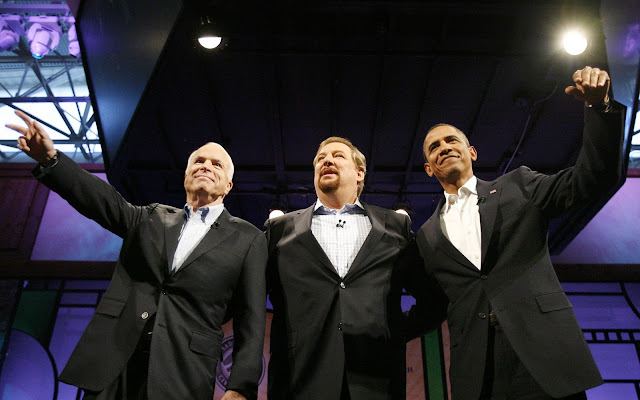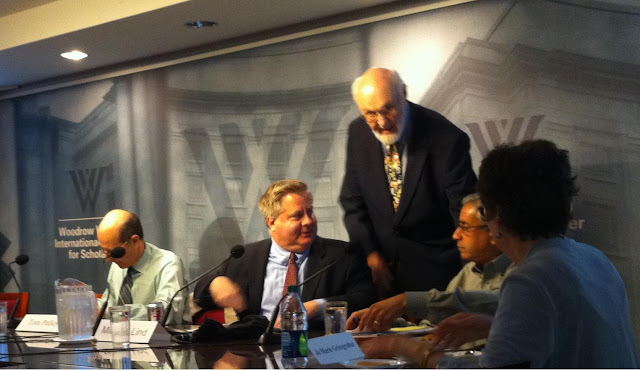We are disgusted with the use of the word "politics" and "religion" in the same sentence. Everyone is all tied by political correctness or win votes or to defend their beliefs. I used to believe that politics and religion should remain in their separate corners - as different as night and day. But now I've been really involved in the political process, I can say this: there is no place where religion is very necessary in politics. And here's another thing: if all the politicians who constantly blabber about their faith, going to church, and the belief in the Bible (or whatever) actually acted in accordance with beliefs that certainly would not be in this pickle .
Politics has to be overflowing with religion; no proselytizing, preaching, mean, hard head, "my way or the highway" people with no sense trying to pawn the religion, but the real deal. Love, respect, decency, compassion, understanding and kindness: these are the characteristics of most spiritual practices. Unfortunately, it is often more "religious" people who have the least of these qualities. Why do not people just walk the walk, as my political heroes / spiritual: Mother Teresa, Mahatma Gandhi, Martin Luther King, and the Dalai Lama. Are
The four titans of politics and religion.
Mother Teresa was a Catholic nun who devoted her life to serving those forgotten by society and government. She and her nuns worked on life in the slums of Calcutta, India, among the lepers and AIDS patients and devastating diseases. She needed $ 3.7 billion to do anything. Mother Teresa has just appeared, and got the job done. She was a political warrior, all 4'9 "and never asked for a vote or a contribution from the PAC. In 1982, at the height of the siege of Beirut, who rescued 37 children trapped in a front-line hospital by a temporary brokering a ceasefire between the Israeli army and Palestinian guerrillas. Can you imagine? Accompanied by Red Cross workers, traveled through the war zone in the devastated hospital to evacuate the young patients. When he announced his intention to save these children around the world went crazy. It is very dangerous! You can not go in there! A major military type he said gravely.
"Oh, Mother Teresa, can not be reached unless there is a cease-fire."
I guess he thought it was impossible. The story goes that my little hero nun looked at him, smiled and said:
"Well, then there will be a cease-fire."
And there it was. She was sure that the power of love and peace. Mother Teresa never judge anyone. Judge not lest ye be judged. Never wait for the policy to assist in its mission to serve the poor.
Mahatma Gandhi was a Hindu, a lawyer, devoted entirely to the will of God. Through his early resistance to tyranny through mass civil disobedience nonviolent freed India from British rule of imperialism. He lived a simple existence, Spartan and yet millions move towards freedom. From Hinduism teaches that all humanity is one undivided family (like Christianity and Buddhism), "pain in a limb is felt throughout the body."
Gandhi maintained at a level to speak only the truth. Do you think our leaders can take a page from that book?
Dr. Martin Luther King Jr. was a Baptist preacher who became the leader of the civil rights movement in America. In the footsteps of Gandhi, King advocated nonviolent resistance but relentless injustice and tyranny. The protests were organized and directed literally changed the face of America. Although he never ran for office, Dr. King was a political and spiritual leader of international fame. He won the Nobel Peace Prize for his work and spent his life energizing and inspiring people to greatness. King speeches and rhetoric were blatantly religious.
"The purpose of life is to do the will of God," he said, "No matter what happens."
Finally, the Dalai Lama is the spiritual and political leader of Tibet. As the 14th Dalai Lama in the Buddhist tradition, His Holiness is believed to be the manifestation of compassion. in 1959 with the brutal repression of the Tibetan national uprising in Lhasa by Chinese troops, His Holiness was forced to flee into exile. It has never stopped working to free Tibet from Chinese oppression, and its ultimate goal is to democratize Tibet, allowing freedom of expression, belief, movement and assembly. He is revered worldwide as an ambassador for true peace, and has also received the Nobel Peace Prize. His Holiness has not sought nor advocated violence against the Chinese government. He has written books on leadership in business, so that compassion in the workplace, the connection between science and religion, and a wide range of other issues. The Dalai Lama describes himself as a simple Buddhist monk.
A Catholic nun, a Hindu lawyer, a Baptist preacher, and a Buddhist monk. Not a politician, and yet each one has had a huge impact worldwide. Each one lives a life fully consistent with his / spiritual principles. To tell the truth, living simply, they believed in selfless service to his people and the world. None of them tried to use religion as a weapon, like so many "religious" people do in our political system. All four of these mammoths walked the walk, and through them the world is much better.
Religion and politics? I hope and pray and work that these two worlds meet and merge. This would mean the end of politics as usual. We should public servants rather than politicians. We would like to have leaders who tell the truth, no matter what, and not act selfishly. We would have people walking in the footsteps of Mother Teresa, Mahatma Gandhi, Dr. King and the Dalai Lama. What a wonderful world.
Archives
-
▼
2011
(29)
-
▼
October
(10)
- Politics and Religion - Where the rubber meets the...
- God's Politics and policy are very different men
- How to win at office politics
- Freedom of expression in the Speakers' Corner (and...
- Do You play positive politics?
- The role of media in politics
- U.S. policy and the second coming of the Tea Party...
- Political Yard Signs - How to get attention
- Political signs placement strategies
- Welcome to Kreitlow Corner
-
▼
October
(10)




































